Riot police, protesters and thugs brutally clashed during demonstrations last night, after President Mohamed Waheed declared he would stay in power beyond the conclusion of his presidential term.
Waheed’s decision half an hour before the expiry of his term prompted people to take to the streets in Male’.
While the majority of protesters were Maldivian Democratic Party (MDP) supporters, other political parties were also demonstrating to demand the constitution be upheld and Shahid be sworn in as president, a protest participant told Minivan News.
The Supreme Court on November 9 upheld its earlier ruling from October 7 stating that Waheed could remain in power past the conclusion of his term on November 11, dismissing a parliament resolution passed last week demanding the installment of the speaker after the expiry of the term.
Waheed, who received just 5.13 percent in the annulled first round vote on September 7, had previously declared that he had no intention of remaining in power “even a day after November 11”.
Prior to Waheed’s announcement, Minivan News observed large numbers of riot police assembling in Republic Square. Following Waheed’s declaration to remain in power protests immediately erupted in Male’.
About 100 protesters on foot and motorcycles had gathered in front of police barricades near Majeedia School on Sosun Magu by 11:45pm (November 10), continuously blasting vehicle horns and shouting at the Maldives Police Service (MPS), calling for Shahid to assume the presidency.
After the protesters moved the police barricades and began walking toward the People’s Majlis (Parliament), Special Operations (SO) police responded forcibly, hauling individuals from the crowd into custody, while aggressively forcing protesters back toward Sosun Magu.
Minivan News witnessed SO police pushing two young Maldivian women as well as a female Chinese photographer to clear the intersection.
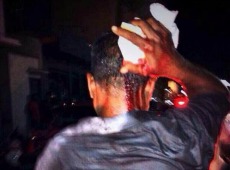 Meanwhile a group of at least six police officers surrounded a male protester who was retreating back toward Sosun Magu, brutally beat him with their batons and pepper-sprayed his face at point blank range, before taking the man into custody. Another male protester on a motorcycle – who was in the process of turning to head back toward Sosun Magu – was hauled off his bike and beaten by multiple police officers.
Meanwhile a group of at least six police officers surrounded a male protester who was retreating back toward Sosun Magu, brutally beat him with their batons and pepper-sprayed his face at point blank range, before taking the man into custody. Another male protester on a motorcycle – who was in the process of turning to head back toward Sosun Magu – was hauled off his bike and beaten by multiple police officers.
Multiple protesters warned Minivan News to be cautious of “drunken thugs” dispersed among the crowd in a bid to incite violence.
A number of protesters alleged that the Progressive Party of Maldives (PPM) had hired gang members to act aggressive and violent, to prompt police to crackdown on the demonstrators.
“Everyone says this will continue until [former 30-year autocratic ruler] Maumoon Gayoom dies. He has too much money, power and influence. He does not want to let go,” 28 year-old Ahmed lamented. “And his corrupted family web have tentacles in everything.”
“The mafia keeps holding on to power. Today is a black day because we are going to crush down our own constitution,” said 27 year-old Saeed.
Shortly after being forced from the intersection, demonstrators surrounded and temporarily hijacked two city buses, pushed them toward the intersection and attempted to tip them over. Large stones were then hurled toward the riot police before they charged the crowd and arrested more people.
By approximately 2:00am the crowd had swelled to around 1000, who were primarily gathered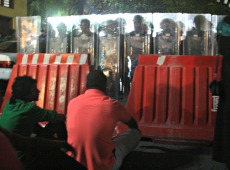 near the intersection as well as scattered down the length of Sosun Magu.
near the intersection as well as scattered down the length of Sosun Magu.
Over 250 SO riot police were present and made multiple incursions into the crowd, charging demonstrators before dragging them away into custody. Some protesters near the police line were throwing stones, making a blockade with bicycles, and removing police barricades. However the vast majority were demonstrating peacefully, with a few sitting down in front of the barricades.
During one particularly violent ‘snatch and grab’ operation around 2:30am, Minivan News heard a small explosion before riot police stormed into the demonstration.
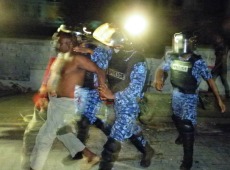 SO officers proceeded to rip the clothes off of a middle-aged man while arresting him. The protester had to hold his ‘mundu’ (traditional sarong) with one hand while being led away to prevent being undressed..
SO officers proceeded to rip the clothes off of a middle-aged man while arresting him. The protester had to hold his ‘mundu’ (traditional sarong) with one hand while being led away to prevent being undressed..
Minivan News also witnessed police hitting and trying to drag into custody a former Province Minister who was peaceably protesting; ultimately he was not arrested.
A group of riot police then began shoving photographers and journalists down the sidewalk, in addition to forcing protesters further south down Sosun Magu. The police line moved aggressively and a group of about 20 people were forced to seek refuge in an alley to prevent being trampled or injured.
Minivan News was repeatedly told by the Maldives Police Service (MPS) to stay behind police lines or be treated as a protester and risk injury. A photographer for local media outlet Haveeru sustained a head injury while reporting on the demonstration.
#NewsUpdate | #Maldives Police brutality against pro-democracy protesters and getting medical | #mvcoup #mvprotest | pic.twitter.com/VMOHeSxNyI
— Ⓜ️4⃣ RN (@mideyalvarez) November 10, 2013
Additionally local media outlet Raajje TV claimed to have witnessed police leading away man by the groin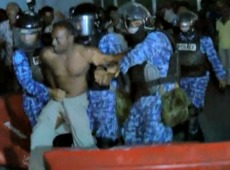 .
.
“They are arresting him so they can go rape him,” two female protesters shouted at the SO as the man was being led away.
Police also grabbed a female protester’s buttocks and were beating old ladies on the side of the road, a protester alleged to Minivan News.
As the police crackdown grew more violent, the protesters’ response escalated, with more individuals throwing stones, while a few set fire to a barricade.
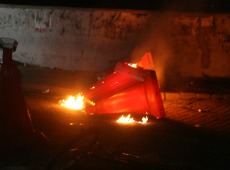 The demonstrators began chanting “money money SO”, and yelling insults at the riot police.
The demonstrators began chanting “money money SO”, and yelling insults at the riot police.
“What is the point in peacefully protesting? That’s what we’ve been doing since the February [2012] coup and nothing has changed,” said a 26 year-old protester.
“Every time [we protest] it’s like a flash of light which enlightens the whole country and then the light goes off for another week or more. It’s been like that since last February. People are feeling hopeless,” he continued.
“We just have a new dictator baghee [‘traitor’] Waheed; he’s Maumoon’s puppet,” he added.
Meanwhile a young boy, who appeared to be about eight years-old, showed Minivan News two stones that he indicated he was going to throw at the riot police. Shortly after, Minivan News learned the boy had been punched in the face and his bloody nose was being tended to by a half-dozen female protesters.
“This is nothing new. The security services have been acting this violent since Maumoon’s time. At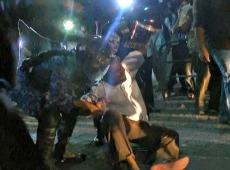 least now you can talk about him without being jailed and tortured,” a former political prisoner and torture victim told Minivan News on condition of anonymity.
least now you can talk about him without being jailed and tortured,” a former political prisoner and torture victim told Minivan News on condition of anonymity.
By 3:30am the crowd had thinned to around 200 protesters, at which point Minivan News witnessed a group of around six men that appeared to be in their 20’s arrived on motorcycles. The group proceeded to surround an MDP protester, forced him against the wall of a building, violently beat and attempted to stab the man with a large kitchen knife.
Police did not respond to the situation for several minutes – despite observing the attack – and eventually proceeded to take the victim into custody.
“Earlier the victim had been throwing stones at police,” an eyewitness told Minivan News. “I saw a police officer pick up the knife [after the attack], but they did not go after the thugs.”
“These gangsters were probably told who to target by the SO,” he alleged.
It is unclear whether the suspected attacker was taken into police custody or led away and then released, as there were conflicting eyewitness accounts.
SO police then proceeded to form a line and forced the remaining protesters and journalists to clear the area.
“There’s no law here according to the Supreme Court, President and police,” said a 27 year-old protester. “It’s a mafia state run by Maumoon and [PPM Presidential Candidate Abdulla] Yameen.”
Minivan News witnessed police arrest more than 25 individuals throughout the course of the protest.
As of 5:00am, one individual had been admitted for a minor head injury sustained in a fight, an Indira Gandhi Memorial Hospital (IGMH) official told Minivan News.
While ADK Hospital told Minivan News that one person was in the emergency room, but could not specify the type of injury.
Police report
Minivan News called Police Spokesperson Chief Inspector Hassan Haneef today (November 11), who requested he be contacted via the police media line instead of his personal number.
Upon doing so, the officer who answered stated the call had been misdirected to the wrong line and requested Minivan News redial the police media line. After repeatedly redialing the police media line there was no response.
The MPS ran a live blog throughout last night’s protest that stated 24 individuals had been arrested.
23:58: A protester has thrown a stone at and injured a police officer.
00:38: A protester threw a rock that hit and injured a journalist. We have received information that he is being treated at ADK hospital.
00:49: Protesters on Sosun Magu are from time to time throwing rocks at police.
00:49: Police have detained an individual for breaking through police barricades.
00:58: Police have detained 6 individuals, including a woman, for breaking through police barricades.
01:05: Some individuals among the protesters on Sosun Magu have vandalized the traffic lights at Sosun Magu/Majeedhiyya School junction.
01:55: A device that appears to be a molotov cocktail exploded in front of the Naadhee Building on Sosun Magu.
01:59: Police have arrested 6 people for obstructing police duty.
02:05: Police have arrested four individuals for crossing police barricades and obstructing police duty.
02:08: Individuals among the protesters on Sosun Magu have kicked down some bicycles on Sosun Magu.
02:18: Police barricades have been torched.
02:19: We have received reports that protesters are from time to time throw rocks and bottles at the media personnel.
02:20: Police have doused the torched police barricades.
02:24: Police are trying to set back the protesters at Roashanee Building on Sosun Magu.
03:21: Police have detained three women who broke through police barricades.
03:31: Police have started to push back the protesters in front of Majeedhiyya School on Sosun Magu.
03:38: Police have arrested four individuals for disobedience to order as they push back protesters.
04:00: Protesters have voluntarily left the area.
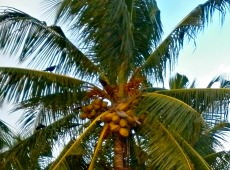 “She thought MDP had cast the black magic spells because the coconuts were yellow,’’ the island council source explained. “Once Moosa found out what his wife had done, he told her it was very bad that she had reported it to police.’’
“She thought MDP had cast the black magic spells because the coconuts were yellow,’’ the island council source explained. “Once Moosa found out what his wife had done, he told her it was very bad that she had reported it to police.’’